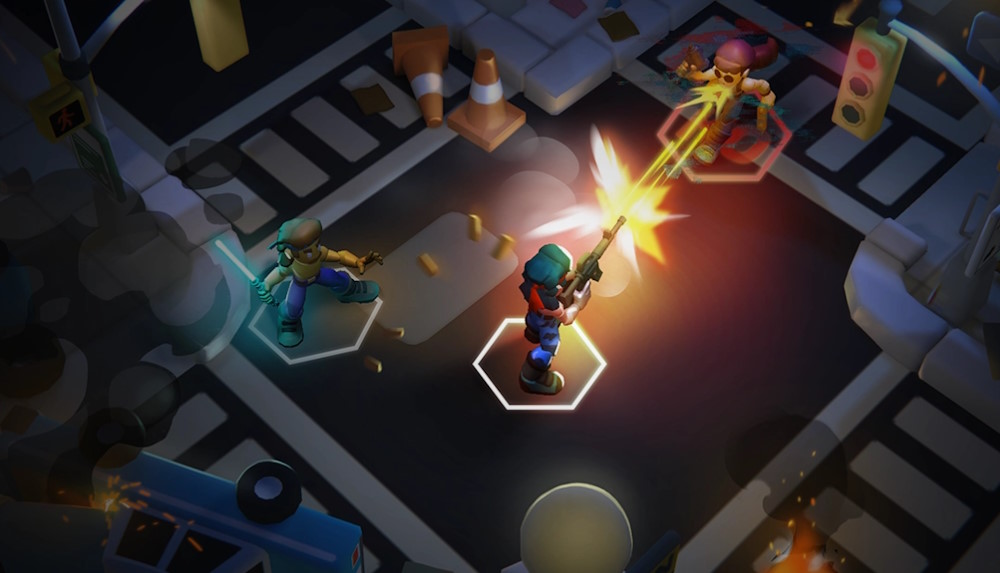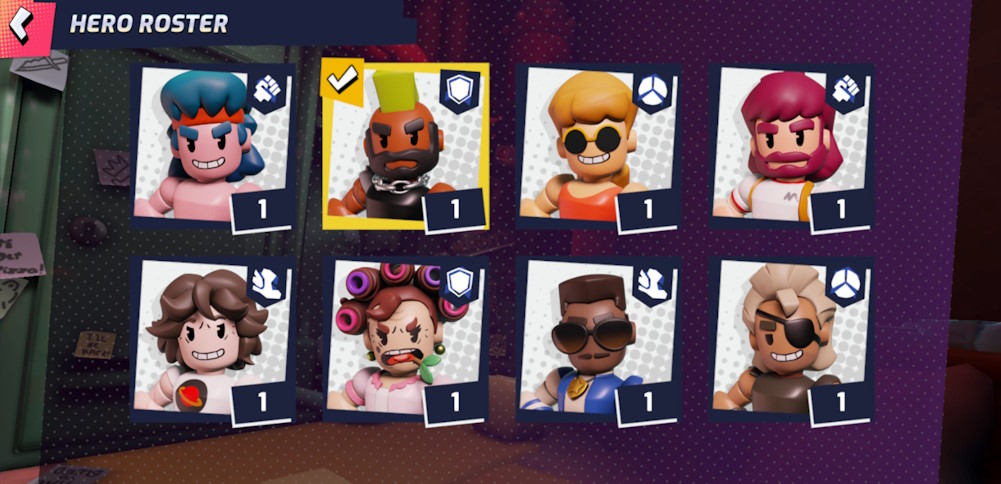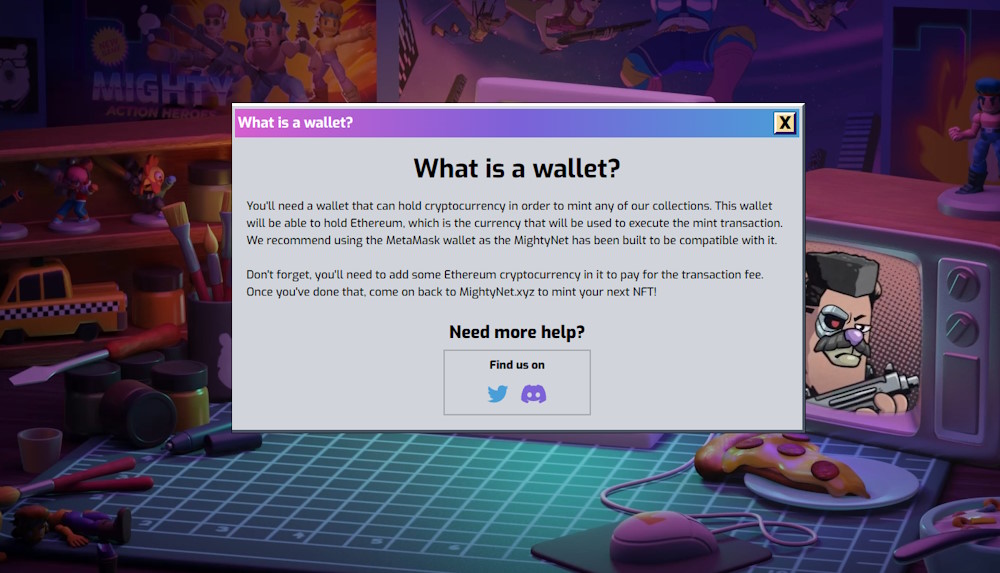Mighty Bear’s Simon Davis on building a blockchain game fighting for your right not to eat Hawaiian pizza

Back in July 2022, Mighty Bear Games announced it had raised $10 million to launch its first blockchain games. Best known for creating mobile titles such as Disney Melee Mania and Butter Royale, the Singapore-based company had been exploring blockchain technology since 2018.
And now it’s setting tongues wagging – not just because of the buzz around its Mighty Action Heroes IP but also because of its impressive growth and forthright opinions on company culture.
Mighty Bear Games was founded by industry veterans hailing from the likes of King, Ubisoft, Lucasarts, EA, Gameloft and Disney. This year, the crew added to its expertise with a newly-appointed COO Assaf Cohen; head of growth Karolina Cooper; web3 lead, Michael Arnold; and head of partnerships, Teri Tan.
Co-founder and CEO Simon Davis has 19 years of international games experience, and he’s often spoken about his commitment to strong cultural values when it comes to building the company and recruiting talent.
Mighty Action Heroes is an isometric battle royale game. It’s browser-based at the moment, but a mobile version is coming.
“A reference point is something like Brawl Stars in terms of the type of combat,” says Davis. “It’s hero-based. It is fast-paced, and it’s very over-the-top. We’re introducing a lot of fun weapons. The outside of the game is like an MMO, and the gameplay is like a shooter, giving a lot of design space and a lot of freedom for players to experiment.”
We leapt onto a Zoom call with Simon Davis to learn more about the company’s plans for the future and the philosophy driving its team.
Blockchaingamer.biz: What are the principles at the heart of Mighty Bear?
Simon Davis: The reason we founded the studio was that we wanted to create an environment to develop games which was non-toxic and addressed a lot of the issues that we see, especially at larger studios where you get a lot of politics, and it becomes a bit of a boys’ club. To be fair, it’s become a lot better since 2016 and 2017! The games industry has grown up a lot in a short amount of time.
Also, we wanted to create games that took very complex multiplayer themes, reimagine them, and repackage them for a mainstream audience. One of the games we previously made was called Butter Royale, where we sat down and asked, “What if you could make a battle royale game, but with no violence? So you could play it with your kids and your family?”
So Butter Royale is basically a food fight. You hit people with baguettes.
Mighty Action Heroes is kind of the same thing. “Web3 games are complex and boring. Why don’t we find a way to make the NFT ownership fun and build a game around the collecting? But also have a fun and not-too-serious take on ‘80s action movies?” The game references a lot of those classic action movies and those tropes. That’s how we approach our studio games.
You’ve recently recruited at your studio and made some high-profile hires. What will expanding your headcount enable you to do? And how do you go about building the right team?
We have around 40 people now. Our org was built around free-to-play and Apple Arcade with a specific skill set. We knew that we were solid on those fronts, but there were key gaps in the team. We’ve moved into a new line of work, and we had to ensure that we were ready not just to compete but to be the best in this space.
So we hired Teri Tan from Galaxy Digital, which is a crypto investment bank. That might look like an unusual hire, but this is someone who has excellent connections within the crypto community and knows all the investors, and will help us with partnerships. Web3 is all about having the right networks and allying with the right projects.
Karolina [Cooper] joined us from Tilting Point. She’s world-class at growth and user acquisition, and historically we’re a studio that’s been more product- rather than growth-focused. Again, we knew that we had to realign there.
If you look at the web3 space today, many games are targeted at a niche, male audience. Our emphasis has always been on inclusion and accessibility.
Simon Davis
When discussing building a team, having a great culture is a goal. It’s never something you really achieve. You have days where the culture is fantastic, but there are moments when people let themselves down because we’re all human. And so we documented a set of principles and things we aspire to be. We always refer to them when we’re making tough decisions.
We try to be honest and transparent. Today we did an AMA. Anyone outside the company would be shocked at the questions I get asked as the CEO and the fact that people feel like they can ask them. And I’ll thank people for asking me a tough question publicly. So they know they can do it.
If you put the team first, the players will be taken care of; and if the players are taken care of, the profits will be taken care of.
You raised $10 million. What are your plans for using this funding to further develop the ecosystem you’ve created?
That money was raised specifically for MightyNet, which is an ecosystem of games that we’re developing. Mighty Action Heroes is the first instalment of that. But MightyNet also has a lot of infrastructure that supports it.
The very first game we built was an MMORPG. There were nine of us. I had hair when we started that project – that’s my answer when anyone asks about building an MMORPG project [laughs]. We built a bunch of infrastructure and tooling for that game because many commercially-available back-ends in 2016 were not very good. We now have infrastructure we’re adapting for web3, and the money supports that.
And then we have other ambitions which are much greater than just content development. The money is to fund that whole vertical of web3 that we’re building up.
How does your company’s philosophy play into Mighty Action Heroes?
If you look at the web3 space today, many games are very “core”; they’re targeted at a very niche, male audience. And so our emphasis has always been on inclusion, positivity, and accessibility. You see that reflected in our game. You have a diverse collection of heroes in the game, and the themes are very universal.

We didn’t make the game too serious. The plotline of Mighty Action Heroes is that there’s an evil force that goes by the acronym of TRASH – I can’t remember what TRASH stands for [laughs] – that is forcing people to have pineapple on their pizza. So you’re fighting for your right not to eat “Hawaiian” pizza. We always lean on stupid stuff like this because humour and food are universal.
Pixar is a good reference, because they create content that adults can enjoy on one level but is also accessible to less hardcore film buffs and children.
For me, it’s about the social side of it. I enjoy sitting down and just playing with my friends. We wanted to create a web3 game that you could load on your phone, sit down in a group of five or six people, and have a blast.
I played a lot of Brawl Stars and Battlelands Royale when it first came out. This may be controversial: many teams over-index on just core gameplay, making the gameplay fun. And that’s great. You can play for like 10 or 20 sessions. But is that going to keep you coming back every day? I think much more about the stuff that goes on outside the game. So we’re thinking about the gamification of collecting the heroes. What can you do by merging different elements in the game or upgrading them?
What are the challenges that you face when building in web3? How did you go about transitioning from a traditional studio to web3?
I’m laughing because we’ve got a lot of it wrong. I think a lot of people did.
I played around with crypto early on, in 2015, and then NFTs. I was working at Ubisoft, and a bunch of engineers there were into Bitcoin in 2013 and 2014 – and I was like, “This is stupid.” But I’m naturally a very curious person. I like to try things, so I started buying little bits of Bitcoin and experimenting with Ethereum when that came out. That’s when it clicked with me, that you could see people building apps on chain, and smart contracts, and stuff that’s cool.
In 2021 we had a game with what I would classify as best-in-class attention metrics. Day one, over 60%. Any games publisher would chop their arm off for those numbers. Then we started running the ad campaigns, and we realised that with the changes to device tracking – it was a new thing – we couldn’t properly rescale this game. It was insane.
Two years earlier, that would have been a multibillion-dollar franchise. But it was not a viable business. I don’t claim to be prescient, but I realised that the free-to-play mobile market was dead at that moment. And you’re seeing it now with many studios closing or consolidating. Our best move was to go all in on web3.
Genuine powerhouses in the games industry are building on-chain games now. They’re concerned about backlash, so they’re calling them “collectables”.
Simon Davis
One of the things I realised early on is that we had to reduce friction for people to get on board. For the team, too, it’s a very different skill set. I underestimated how difficult it would be for somebody who’s been making web games for ten years to switch to making blockchain apps. We had some teething issues for about six months last year.
But I gave everyone on the team $200 worth of Ethereum and told everyone that they had to have an NFT in their wallet by the end of the week. That changed everything. All of a sudden, people were trading on OpenSea. They were doing mints. They were in the Discords. They understood things.
What about pushback from traditional gamers? Blockchain games have their vocal detractors.
What I’m going to say is going to sound spicy. I was making free-to-play games in the late 2000s, so I learned then not to take the angry voices on the internet too seriously!
There’s a difference between what people say and what they do. I remember when people said they’d never play a mobile game or a free-to-play game, right? I remember getting an email from someone telling me I’d ruined Christmas one year. Then you look at that person’s account and see that they played and spent money that Christmas! It’s like that old joke about the person that brings the DVD back to Blockbuster and says, “It’s the worst thing I saw ten times.”
I remember when people were against free-to-play, but all of a sudden, League Of Legends and Fortnite are the biggest games in the world! Free-to-play isn’t just Farmville. Along comes Clash Of Clans and Candy Crush on mobile… It’s such a cliché, but I think it’s just about making games people want to play.
This year at GDC, we finally saw many blockchain games which were developed as fun experiences first. Are you sensing that change too?
Yeah, very much so. The first wave of blockchain games came from crypto people putting a game on an economy. I’m not going to dismiss it because I think they did do a lot of interesting work and pioneering. There’s debate whether Axie Infinity was that “Farmville moment”. Farmville demonstrated free-to-play and went a long way towards validating and proving certain things.

Those first creators must now compete with people who have been making games for 20 or 30 years. I won’t name names, but at GDC, I was catching up with people I’ve known for years – genuine powerhouses in the games industry, household names – and they are building on-chain games now. And maybe they’re doing it in a way that is a bit sneaky because they’re concerned about backlash, so they’re calling them “collectables”.
Sony just filed a patent for collectables. I’m sure you saw the announcement from CCP as well, how they’ve got an online spin-off. It’s very sudden when it does change.
How will Mighty Action Heroes make it easy for people to get on board without them needing a lot of technical knowledge? Are you going to have a wallet created for players in the background?
We are at launch. The focus is really on the game and validating that the game works and that it retains players.
We’re not building our own wallet but working with an integrated wallet that players can access using their social log-in. We are hosting assets for people and abstracting all of the stuff like gas fees. We’re going as far as possible so the player doesn’t have to think.
There’s a famous book on user experience called Don’t Make Me Think. Especially for games, that’s very much what I believe. Someone said to me a while back, “We should be educating players.” I was like, “No, dude. Players don’t play a shooter to learn. They’re there because they want to shoot things! They’re not there to be taught about decentralisation or how to manage a seed phrase correctly. They’re there to have fun.” So we will abstract that stuff away as much as possible.

It’s an ideological debate. Maybe we have to sacrifice some of the ideological stuff to get players on board, and maybe at a later date, we can be more decentralised and more focused on privacy. But not today.
AI is a buzzword in the games industry at the moment. Are you taking an interest in that?
I wrote recently about how at Mighty Bear, we’re using AI in game design, art pipeline production, narrative, and marketing – across the board. It’s allowing us to be way more productive. We’re doing it in ways I didn’t even think were possible six months ago, even down to training our animators to write good prompts. It helps them generate scripts. And they don’t need programmers. They are now writing their own code using ChatGPT. So as a developer, I think that’s awesome.
There were concerns [about AI] just like with web3. The approach I took is: we’re already doing web3, so we’ve already crossed the Rubicon here! We may as well just go all in.
Maybe we have to sacrifice some ideological stuff to get players on board, and at a later date we can be more decentralised and focused on privacy. But not today.
Simon Davis
We sat down with the team and said, “This is why we think it’s important. These are the ethical considerations.” We addressed their concerns honestly. I also said, “You guys can choose not to do this, but then you’re competing against people who can do it. So before an AI takes your job, it’s more likely to be taken by another artist who knows how to use these tools. Which side of the equation do you want to be on?”
So we train the AI on our own models and content. So we’re not using external content. We use it for concepting. It’s an accelerant for people and a productivity tool.
Some of the people who were the most reticent are the ones who are most excited and just doing mad shit that I couldn’t imagine. “Wow, you’ve managed to integrate Stable Diffusion into Photoshop natively. How on earth did you do this?” It’s cool. Every week, we’re seeing major developments. I’ve never seen anything like this in my career. I can’t imagine where we’ll be in six months, but it’s very cool.
Find out more about Mighty Bear Games at its official site. We spoke to the team last year about their move to web3. Simon Davis will be speaking at our partner event GameExpo Summit in Dubai next month.
